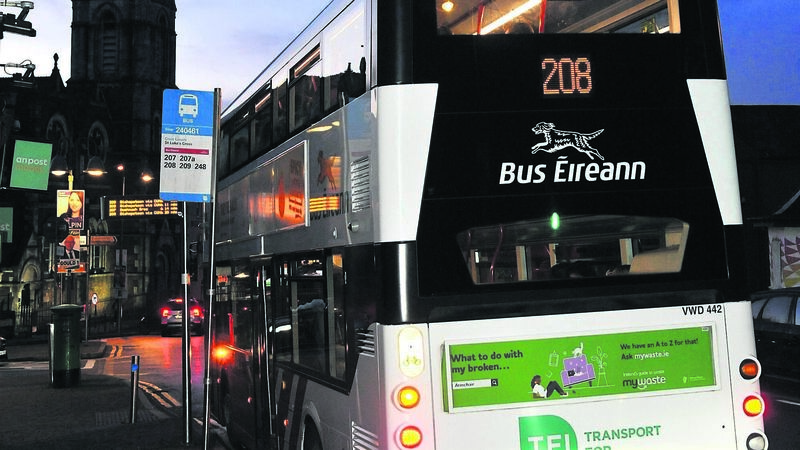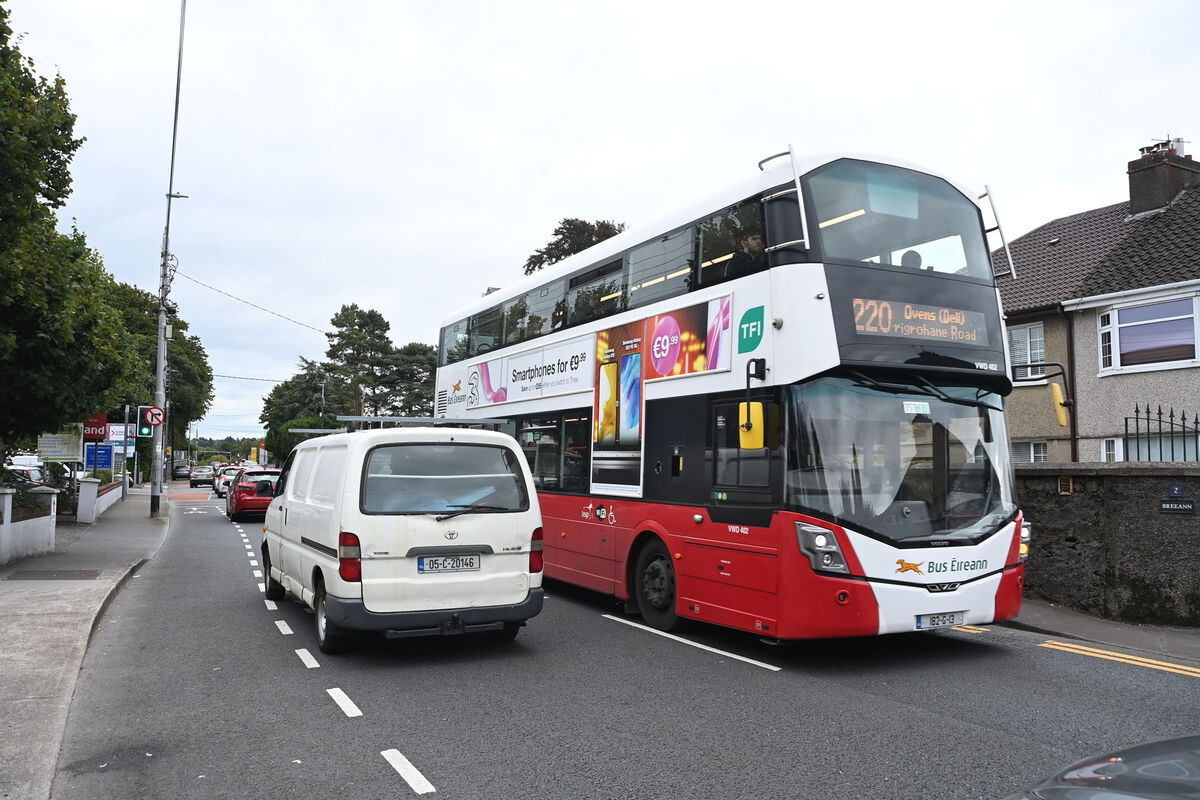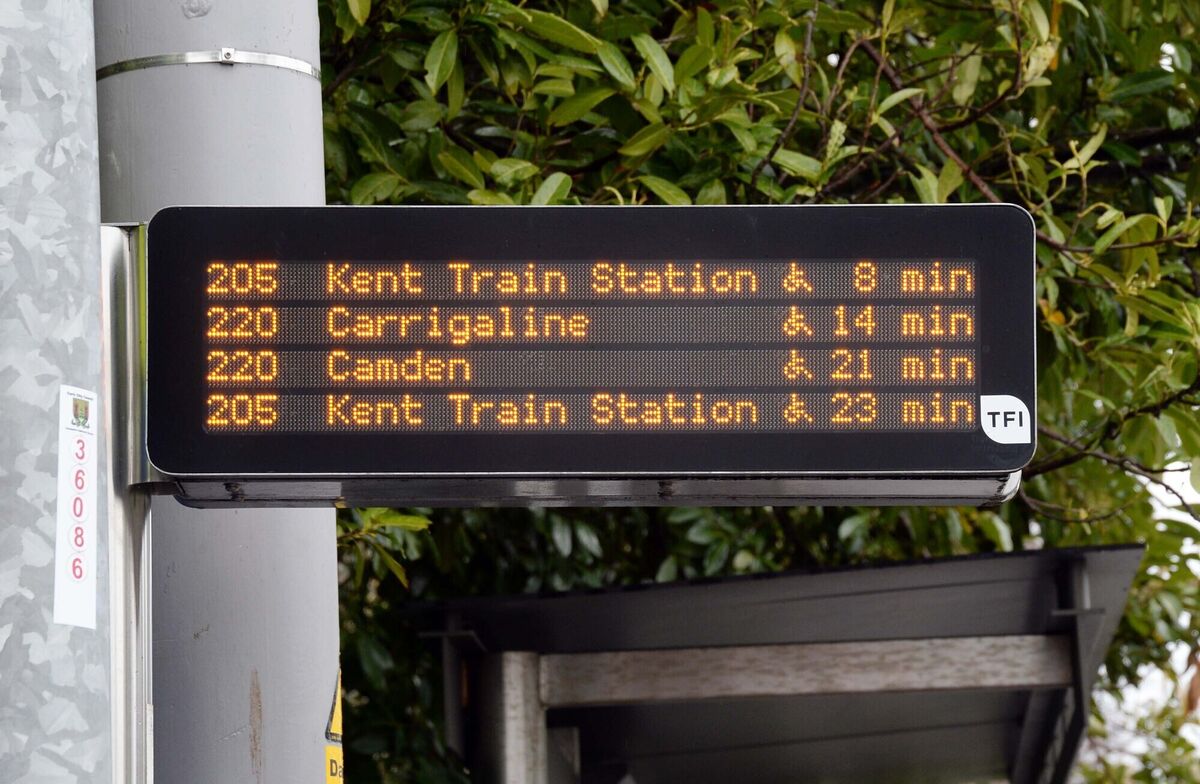Left waiting... Cork’s misfiring bus system

The 208’s actual wait time at the start of the year was 12.4 minutes, 3.4 minutes over the planned wait time of 9 minutes. By mid-2024, the average actual wait time had risen to 14.6 minutes.
A third of all Cork city bus services have arrived late so far this year, with Bus Éireann punctuality and reliability data showing that while lateness is decreasing, buses are more frequently missing stops or not running at all.
Overall, 58% of Cork city buses were on time, 35% of them arrived late, and 7% left a stop early, with approximately 10% of scheduled kilometres not operated at all between January 1 and June 30 of this year; while for high frequency routes, wait times increased significantly.
The figures for 22 Cork city bus routes were sent to Sinn Féin TD for Cork North Central Thomas Gould in response to a Freedom of Information (FOI) request — the data is formatted by four-week periods, with finalised data available for the first three months of the year, but only provisional data available from March 25 to June 30, 2024.
The data shows that the 201 was the worst performing bus, with just 48% of on-time departures, followed by the 219, which was on time just 53% of the time, the 214, 225 and 220X were on time 54% of the time.
The 220, 226, 245, 215, 207, 209, 216 and 223 were on time 55% to 65% of the time, while the best performing buses were the 213 and the 223x (both 81% on time), the 215A (77%), the 207A (73%), the 209A (70%) and the 203 (66%).
There were 1,720,533 late departures in the first half of the year — overall, 35% of all buses were late, with the 214 the worst performing in this regard.
The 214’s 45% lateness was followed by the 226 (late 40% of the time), the 201, 220 and 220X (39% late), 215 and 225 (37%), 209 (36%), 245 (34%), 219 and 207 (33%) while the buses with the least late arrivals was the 213 (11%).
Overall, 418,972km was counted as “lost kilometres” — this is ground that a bus was scheduled to cover but did not, either due to skipping stops or a planned bus not operating. This is divided into 324,759km marked as deductible and 94,212km marked as non-deductible.
This was the case for 17% of the 209’s planned kilometres, 14% of the 220’s, 12% of the 203’s and the 214’s, and 10% of the 216’s.

The amount of buses being late has decreased significantly from 38% in February and March to just 29% in June, but lost kilometres have increased from 8% at the start of the year to 13% in June, suggesting that some bus drivers may be skipping parts of the route in order to save time.
Punctuality is calculated differently for high frequency routes, but data for the 202, 205 and 208 shows that wait times have increased across all three services, suggesting there are fewer buses serving the route than before.
The 202 has an average planned wait time of 12 minutes, meaning that the buses should be no more than 12 minutes apart — if someone arrives having just missed one bus, they should not have to wait longer than that for the next one.
In January of 2024, the actual wait time for the 202 was just over 15 minutes, an average excessive wait time of 3.2 minutes, but by the end of May/start of June, this had increased to nearly 18 minutes, an excessive wait time of almost six minutes.
The planned wait time for the 205 is 11.3 minutes, and in January the actual average wait time was 13.7, an excessive wait time of 2.4 minutes — by May/June this had increased to an average wait time of 14.3 minutes, an excessive wait time of just over 3 minutes.
Finally, the 208’s actual wait time at the start of the year was 12.4 minutes, 3.4 minutes over the planned wait time of 9 minutes, by mid-2024 the average actual wait time was 14.6 minutes, meaning customers were waiting 5.5 minutes over target for the next bus.
Conor Healy, CEO of Cork Chamber, highlighted the importance of a reliable public transport to businesses in Cork city, saying “we have a growing population and more people at work than ever”.
“Having a properly functional public transport system is really important — we need a combination of transport from suburban rail services to bus services to hopefully light rail in future, as well as increased usage of active travel like cycling and walking,” Mr Healy continued. “There’s no doubt at the moment that there are challenges with bus services, we have a lot of congestion that is resulting in buses being late — a bus system only works and people only use it if it is reliable and efficient, but there are challenges there at the moment.
“There need to be greater resources available in Cork to grow routes and services, there are challenges at the moment with recruiting bus drivers but everything possible needs to be done to get the required number of drivers on board to help the service work effectively.”

The issues outlined in the FOI data “really highlight the importance of the delivery of Bus Connects in Cork,” Mr Healy said, explaining: “Buses are currently competing in the same traffic as cars, and until we have bus corridors that allow for buses to move freely through the city, particularly on key routes, we are going to have challenges.
“Cork Chamber’s major prerogative is for Bus Connects to move forward as quickly as possible, and that it receives full support, including politically, to ensure that there are no impediments.”
Mr Gould told The Echo: “It is essential to deliver public transport in Cork. Without it, we are not going to be able to resolve any of the challenges, but in addition, short term resourcing and having drivers available is needed in the interim. What we can see from these figures is that almost one in every two buses in Cork city did not leave their stop on time or did not show up at all.
“I am being contacted weekly by people left standing in the rain, at bus stops with no shelter, or with no way home from work.
“For so many of my constituents, they are now telling me they will have to buy a car and drive into the city centre to get to work. That is what we are supposed to be preventing — it is bad for the environment and it is bad for the city. For many people, the bus is their only chance at independence. Elderly people in particular are being left waiting for buses that just never show up.
“They rely on this to do their shopping, to get to the doctor and to socialise. People on a pension cannot afford to pay for taxis because Bus Éireann and the NTA [National Transport Authority] are failing to do their job.”
Mr Gould acknowledged that this isn’t the fault of the drivers, saying: “They are getting the brunt of people’s anger and I’ve no doubt this is making their job more difficult — it is the NTA and Bus Éireann who are at fault here for under-resourcing and underfunding the bus service in Cork city.”
Constituents who contact him “are at their wits’ end” and “just want a bus service they can rely on,” but instead “are left waiting in the rain for buses that never turn up,” he said.
“Students running late for exams, parents missing work, older people left in the rain — people depend on the buses and yet, there is no sign of improvements,” Mr Gould said.
“Instead, we are seeing increases in the number of buses that are either skipping stops or not running routes at all. That is actually nearly worse for many people than a late bus.”
Mr Gould concluded: “This issue is impacting people right across the city. People in areas like Ballincollig and Faranree with buses like the 220 and the 203 that could always be relied upon are now regularly left standing at bus stops. Routes like the orbital 201 that takes people from Knocknaheeny to CUH [Cork University Hospital] are reliable less than half of the time. If half of buses either don’t show up or aren’t on time, then surely the minister must intervene.”

Sinn Féin will be hosting a series of public meetings in communities over the coming weeks which Mr Gould said he will be sharing details of shortly, explaining that they want to bring people together to highlight just how badly people are impacted by these issues.
Bus Éireann told The Echo that it “acknowledges the figures referenced for Cork city and apologises to affected customers for any inconvenience caused”.
They put out over 295,000 passenger journeys per week in Cork city, and the key challenges include traffic congestion, as there is very limited bus prioritisation outside of Dublin.
A Bus Éireann spokesperson said: “Congestion means delays to services and can have a knock-on effect on the service as it operates throughout its journey. Currently, just 2% of the kilometres travelled by our vehicles in Cork are in bus lanes,” they said, adding that motorists illegally blocking bus lanes or vehicles parking at bus stops also cause undue delays to services.
“Like other operators in the industry, we are dealing with short-term challenges for the recruitment of both drivers and mechanics.”
At four open days that occurred on August 22 -25, D licence holders were invited to attend and hear about incentives on offer to join Bus Éireann.
The Bus Éireann spokesperson explained: “Drivers are offered a secure job with a competitive salary and terms and conditions, including pension, GP scheme, travel scheme and recognition awards for long service, safe driving, etc. We have an employee engagement rate of 72%.”
Bus Éireann has also established a training programme for B licence holders to convert to D licences in Cork, which will be a key area of focus for recruitment going forward.
The spokesperson concluded: “We are building a pipeline of both drivers and mechanics but owing to the welcome expansion of services and our ambitious growth targets, recruitment in Cork will remain a key priority.”







 App?
App?


